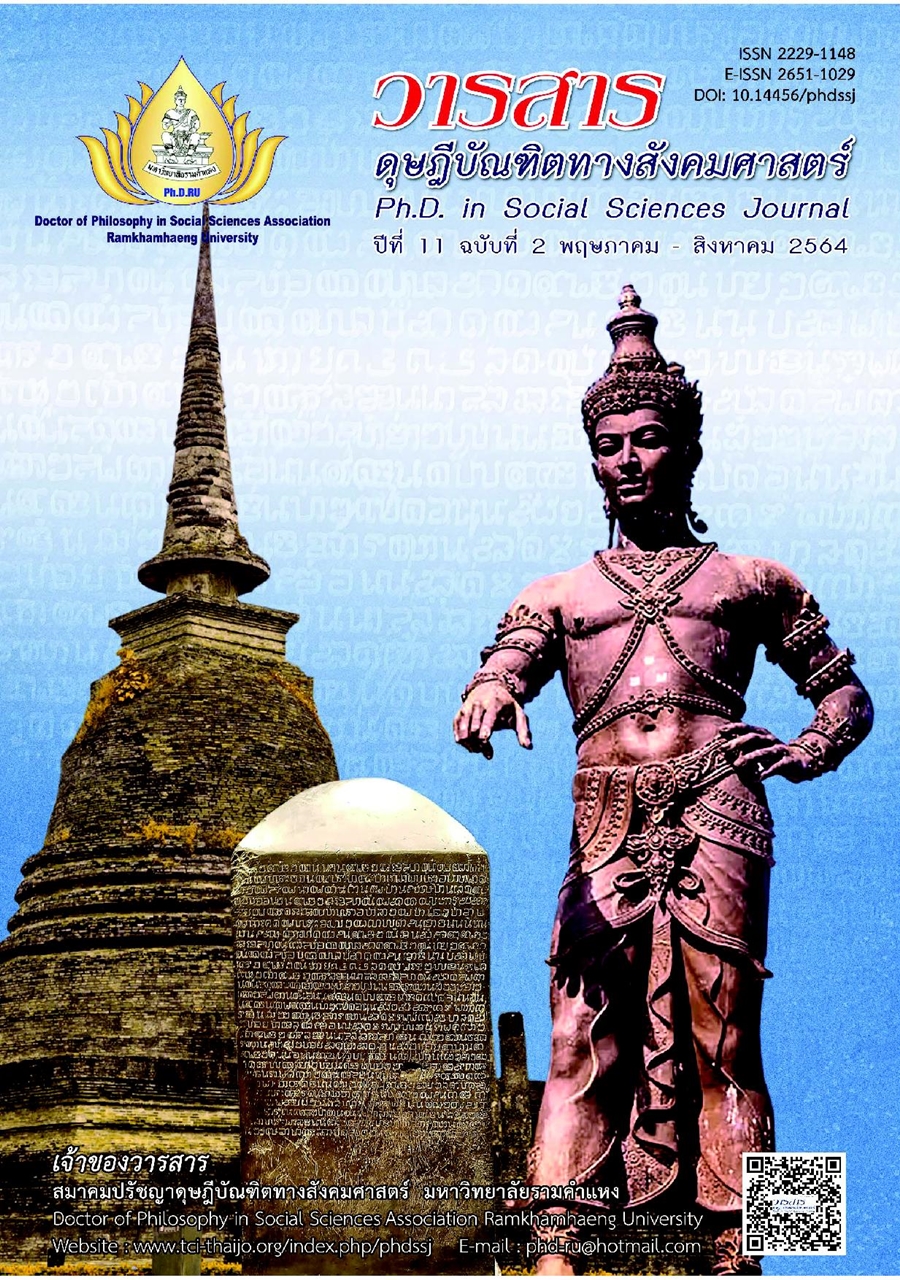The Impact of Effective Teams and Their Antecedents on Perceived Organizational Performance in the Thai Auto Parts Industry
Main Article Content
Abstract
In this dissertation the researcher had the purposes to study the impact of effective teams and its antecedents consisting of transformational leadership, organizational climate and self-efficacy to perception of organizational performance and to confirm the Structural Equation Model with the empirical data in the Thai auto-parts manufacturers. Research methodology is a mixed research using qualitative research by in-depth interview of 6 key informants, and 4 focus group discussions. In the quantitative research approach, a questionnaire was used as an instrument to collect data using the method of systematic random sampling. The research population consisted of 512 employees The Structural Equation Modeling (SEM) was used for the statistical analysis.
Findings showed that transformational leadership had a positive impact on organizational climate, self-efficacy, effective teams, and perception of organizational performance. Organizational climate had a positive impact on self-efficacy, effective teams, and perception of organizational performance. In addition, self-efficacy had a positive impact on effective teams and perception of organizational performance. Effective teams had a positive impact on perception of organizational performance. And Structural Equation Model was consistent with the empirical data. Findings also showed that transformational leadership created a good organizational climate, self-efficacy personnel and strong teams to reach the goals of organization. This will benefit to the study of the team and perception of organizational performance in other industry groups in the future.
Article Details
Academic articles, research articles, and book reviews in the Ph.D. in Social Sciences Journal are author’s opinions, and not the publisher’s, and is not the responsibility of the Ph.D. in Social Sciences Journal Philosophy Association, Ramkhamhaeng University. (In the case that research is done on human, the researcher has to be trained in Ethics for Doing Research on Human Training and has to produce the evidence of the training).
References
Alaarj, S., Abidin-Mohamed, Z., & Bustamam, U. S. B. A. (2016). Mediating role of trust on the effects of knowledge management capabilities on organizational performance. Procedia–Social and Behavioral Sciences, 235, 729-738.
Ancarani, A., Di Mauro, C., & Giammanco, M. D. (2011). Patient satisfaction, managers’ climate orientation and organizational climate. International Journal of Operations & Production Management, 31(3), 224-250.
Audenaert, M., Decramer, A., Lange, T., & Vanderstraeten, A. (2016). Setting high expectations is not enough Linkages between expectation climate strength, trust, and employee performance. International Journal of Manpower, 37(6), 1024-1041.
Bandura, A. (1994). Self-efficacy. In V. S. Ramachaudran (Ed.), Encyclopedia of human behavior vol. 4 (pp. 71-81). Academic Press.
Bass, B. M. (1990). From transactional to transformational leadership: Learning to share the vision. Organizational Dynamics, 18(3), 19-32.
Bass, B. M., & Riggio, R. E. (2006). Transformational leadership. Lawrence Erlbaum Associates.
Bono, J. E., & Judge, T. A. (2003). Self-concordance at work: Toward understanding the motivational effects of transformational leaders. Academy of Management Journal, 46(5), 554–571.
Boon, A., Raes, E., Kyndt, E., & Dochy, F. (2013). Team learning beliefs and behaviours in response teams. European Journal of Training and Development, 37(4), 357-379.
Bosak, J., Dawson, J., Flood, P., & Peccei, R. (2017). Employee involvement climate and climate strength: A study of employee attitudes and organizational effectiveness in UK hospitals. Journal of Organizational Effectiveness: People and Performance, 4(1), 18-38.
Coetzer, G. H., & Richmond, L. (2007). An empirical analysis of the relationship between adult attention deficit and efficacy for working in teams. Team Performance Management, 13(1), 5-20.
Delaney, J., & Huselid, M. A. (1996). The impact of human resource management practices on perceptions of organizational performance. Academy of Management Journal, 39(4), 949-969.
Emmerik, H. V., Jawahar, I. M., Schreurs, B., & Cuyper, N. D. (2011). Social capital, team efficacy and team potency: The mediating role of team learning behaviors. Career Development International, 16(1), 82-99.
Fisher, Y. (2014). The timeline of self-efficacy: Changes during the professional life cycle of school principals. Journal of Educational Administration, 52(1), 58-83.
Hair, J. F., Black, W. C., Babin, J., Anderson, R. E., & Tatham, R. L. (2010). Multivariate data analysis (7th ed.). Prentice Hall.
Jenatabadi, H. S. (2015). An overview of organizational performance index: Definitions and measurements. Retrieved from https://papers.ssrn.com/sol3/Delivery.cfm/SSRN_ID2599439_code2179924.pdfabstractid=2599439&mirid=1
Sharma, R., & Singh, S. (2017). Transformational leadership style and self-efficacy among teaching professionals. The International Journal of Indian Psychology, 4(2), 140-147.
Srisilaruk, R., & Pasunon, P. (2016). Perception of the organizational climate and organizational citizenship behavior of department of human resources and compliance Thai Airways International Public Co., Ltd. Business Review Journal, 8(1), 61-83. [In Thai].
Torres, F. C., Espinosa, J. C., Dornberger, U., & Acosta, Y. A. C. (2017). Leadership and employees’ innovative work behavior: Test of a mediation and moderation model. Asian Social Science, 13(9), 9-25.
Van den Bossche, P., Gijselaers, W. H., Segers, M., & Kirschner, P. A. (2006). Social and cognitive factors driving teamwork in collaborative learning environments: Team learning beliefs and behaviors. Small Group Research, 37, 490-521.
Verma, N., Rangnekar, S. N., & Barua, M. K. (2016). Exploring decision making style as a predictor of team effectiveness. International Journal of Organizational Analysis, 24(1), 36-63.
Yasir, M., Imran, R., & Irshad, M. K. (2013). Mediating role of organization climate in the relationship between transformational leadership, its facets and organizational performance. Actual Problems of Economic, 7(7), 559-569.
Zoltan, R., & Vancea, R. (2015). Organizational work groups and work teams–approaches and differences. Eco Forum Journal, 4(1), 94-98.


